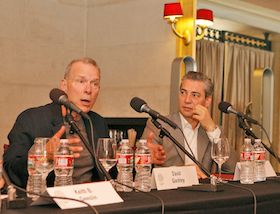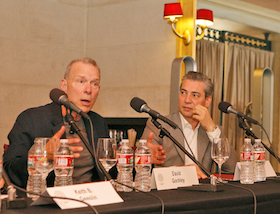
Photo by Cory Weaver
Reported here in January and March, General Director David Gockley's retirement plans were finally made official by the San Francisco Opera at a press conference on Friday.
But it is not yet time to say farewell to a leader with an extraordinary record. Gockley said that during his remaining 22 months on the job he is not "going out like a lamb." As a case in point, he announced the greatly successful 2011 Wagner Ring (Francesca Zambello's "American" production) will be revived in 2018.
Gockley can plan for the distant future because beyond his retirement in the summer of 2016, at the request of the board of directors, he will program the next two seasons.
He is leaving for personal and philosophical reasons: He will be 73 at the end of the the S.F. run, after 45 years of success filling top positions in one of the most nerve-wracking and impossible jobs around. He will also be at the end of one decade with the company here, and his stated belief is that there should be "a new leader with fresh ideas, energy, eyes, and ears."
He said that no CEO should stay more than 10 years (in any business), though he headed the Houston Grand Opera for 33, making it a major, pioneering company with the presentation of new works.
From the beginning of the Great Recession in 2008 through 2013, Gockley had to prop up and save San Francisco Opera in deep crisis. He was completely open and honest about the situation. As Greg Sandow reported:
Here’s a classical music leader pointing at dark clouds hovering over our field. I’m talking about an admission of serious trouble, in an extraordinary — extraordinarily honest and forceful — statement by David Gockley, general manager of the San Francisco Opera, and (I’d think by more or less unanimous acclaim) one of the top arts managers in the US.
Back then, Gockley warned that "The 'business as usual' model will cripple San Francisco opera in the next two years if there is not major change." By handling labor contracts to general satisfaction, raising tens of millions of dollars in contributions, retaining audience loyalty, and bringing in new fans (although not quite to what that vital influx should be), Gockley made that change happen, and the company is in good shape today.
The turnaround had many components, including an important, but not widely recognized one: his surefooted handling of complex and difficult labor contract negotiations, reaching viable agreements. Gockley also balanced well-selling warhorses (with outstanding casts) with commissioned new works. Although no opera company can ever satisfy all audiences, Gockley's game plan looked good from an artistic point of view and maintained — at times increased — attendance.
Retirement announcements often sound like obituaries, but in this case, Gockley's accomplishments point to the future as well as acknowledge the past. The best example of that is his "electronic leadership," the creation of the Koret-Taube Media Suite, which enabled free streaming of live telecasts to the Ballpark and elsewhere, broadcasts, telecasts, and recording of performances on CD, DVD, and Blu-ray.
Another Gockley coup is the planning, financing, and now construction of the Diane B. Wilsey Center for Opera in the neighboring Veterans Building to provide vital facilities, an education center, a flexible theater, and more.
Beyond that, with nothing lamb-like in view, look out for more news from a justly lionized leader.

